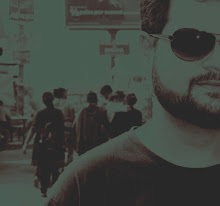 |
| A Poster of the Film |
Thank you Walt Disney and UTV
Motion Pictures for "The Untold Story of India’s Greatest Warrior"!
“Where there is truth, there is victory”. Arjun: The Warrior Prince begins with
the dictum. The fact is, director Arnab Chaudhuri’s animated venture on one
of the most sought after handsome hunks of the Indian epic is a film made from
the heart and there lies its victory. The film however is neither a B.R. Chopra
like never ending tale nor a multicultural blend à la Peter Brook.
The film begins in medias-res. The
Bildungsroman narrative has for its narrator, a beautiful woman, who indulges
in telling the story of a brave warrior Arjun to a little boy. The film
captures the lives of the megalomaniac Kauravas and the victims of Fate, the Pandavas,
and their lust for power. It is circumscribed around the character of
Arjun, the most eligible disciple of Acharya Drona and the lessons he learns
during his journey from innocence to experience. From being a mere prince who is afraid of
bloodshed, he emerges as a courageous warrior, a dedicated brother and an
avenger of his wife’s humiliations. Rajesh Devraj’s editing suits the need of
the film and the abridged story telling is done intelligently not to meander
unnecessarily, giving the film the much required crispy and edgy structure.
This animated version of the epic
dares not to compete with its Western counterparts. The technology is brilliant
as fas as Indian standards of animation goes and if you looking for a Madagascar, or an Ice Age or a Toy Story, I’m
afraid, beware! There are a few scenes which talk about the superb efforts in
technical departments. Arjun’s archery while shooting the golden fish during Panchali’s swayamvara
is a spectacular watch and so is the climax. The rich use of colours and shades of grey are cinematographer Hemant
Chaturvedi’s magic. Vishal Shekhar’s music is apt for a heroic tale and the
melody of the voices of the characters adds to the flavour. Yuddvir Bokaliya’s
Arjun, Sachin Khedekar’s Lord Krishna or Ila Arun’s Kunti are music to the
ears.
Aimed primarily for the children,
the film however shows gory violence and bloodshed on screen. The patriarchal
world gains an upper hand in the narrative yet the director includes gender
issues brilliantly. Look out for the intelligent mix of the ‘male’ bravery and
the ‘female’ façade in the narrator. For an animated
text that this film is, Arnab Chaudhuri merges several issues along with the
stellar visuals to instruct as well as to delight his audience.
The narrative, both pre and post
intermission is a mark of craftsmanship. However, behind the narrative and the
treatment, the original essence of the epic gets somewhat blurred. For a tale of
betrayal, revenge, deceit, love, passion and power that the multi layered epic
provides, Arjun: The Warrior Prince fails
to rise above the average. Apart from Arjun’s trajectory, nothing really
evolves. Even the gallery of such brilliant characters of the epic remains
somewhat stagnant. Except for a Gandhari who is taller than Dhritrashtra and a
Machiavellian Shakuni mama, the other characters remain flat.
Arjun: The Warrior Prince is a refreshing change. Its faults and
fissures can easily be overlooked considering the change it has brought to
animation in the country. The film promises a visual treat and a thrilling dénouement,
and focuses on newer dimensions in Arjuna’s portrayal, and these are reasons
enough to see what it takes to be brave. Bravery is not embedded in the brawn
but in the brain and this underrated animation brings this reality home.


.jpg)